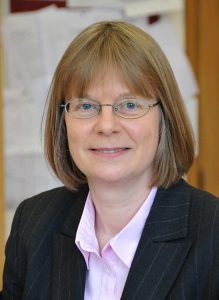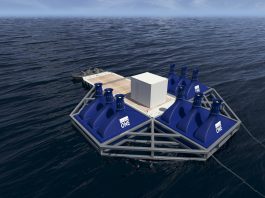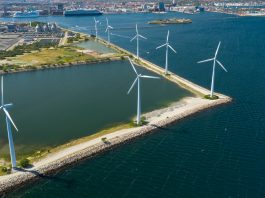Professor Dame Lynn Gladden, Executive chair of the Engineering and Physical Sciences Research Council (EPSRC) outlines their efforts to achieve the UK’s net zero ambitions.
The solutions developed by scientists, engineers, and innovators will play a critical role in delivering the UK’s net zero ambitions, by addressing the challenges posed by climate change, developing resilient and sustainable energy supply solutions, and delivering prosperity through new and emerging technologies and industries.
Building on a strong track record of achievement, as part of UK Research and Innovation, the Engineering and Physical Sciences Research Council (EPSRC) works in partnership to deliver innovations and impact policy in, for example, whole energy systems methodology, energy demand reduction, and energy networks.
Offshore wind
A great example of EPSRC-funded research and innovation in the energy sector is in offshore wind. In 2006, EPSRC support sparked renewed impetus in offshore wind energy research, which has subsequently underpinned the UK’s leading role in this field today.
The UK now has the highest level of installed wind capacity, amounting to more than a third of global capacity. Leading EPSRC-funded research groups have contributed to anchoring in the UK the R&D capabilities of some of the world’s leading offshore wind businesses. Additionally, the Supergen Offshore Renewable Energy Hub, led by the University of Plymouth and involving ten universities across the UK, is a leader on the convergence of offshore wind, marine, and tidal energy technologies.
EPSRC’s Prosperity Partnerships
EPSRC works with business partners in many ways. EPSRC’s Prosperity Partnerships are business-led collaborations between business and academia to support discovery research that is essential to addressing the challenges faced by the business partner. Continuing the theme of offshore wind, an example of a Prosperity Partnership in action is a £7.6m programme which has brought the world’s largest offshore wind developer, Ørsted, into collaboration with researchers at the University of Sheffield.
Another example of a Prosperity Partnership in the energy space is the work of the University of Oxford and spinout Oxford PV. This team is using Prosperity Partnership funding to commercialise and manufacture solar cells utilising perovskite technology developed at the university – these materials generate a third more electricity than traditional solar cells.
Sustainable future requirements
Building a sustainable future also requires us to make better use of what we already have. The £30m National Interdisciplinary Circular Economy research programme, encompassing 34 universities and 200 industry partners, has been launched to support the UK’s shift to a circular economy. It aims to deliver environmental and economic benefits by helping industry and society to use fewer resources, and to reuse and recover products and materials instead of disposing of them after use.
The success of the UK’s researchers and innovators is a result of sustained investment. Since 2004, EPSRC has invested £1.1bn in energy and related areas of research. Much of this investment has been in discovery-led research, acting as a catalyst for further funding from both the public and private sectors. To date, EPSRC grants have secured follow-on funding of around £2bn from a range of academic, charity, and public and private contributors, illustrating the growing economic importance of the energy and related sectors to the UK. In 2005, project partners for EPSRC grants generated £233bn in UK revenues and employed around 1.1 million people. By 2018, revenues had increased to around £500bn and employment had almost doubled.
The new technologies and approaches which emerge from the UK’s engineers and scientists really will drive growth in both existing and new industries and sectors, creating high-skilled jobs. To address the challenges we face and to seize the opportunities of a net zero future, ingenuity, expertise, partnership and sustained support are required. At EPSRC, we are committed to delivering what is needed to build a sustainable and prosperous future for all.

Engineering and Physical Sciences Research Council (EPSRC)
Professor Dame Lynn Gladden
Executive Chair
Engineering and Physical Sciences Research Council (EPSRC)
epsrc.ukri.org
https://www.facebook.com/epsrc
https://twitter.com/epsrc/
Please note, this article will also appear in the eighth edition of our quarterly publication.









